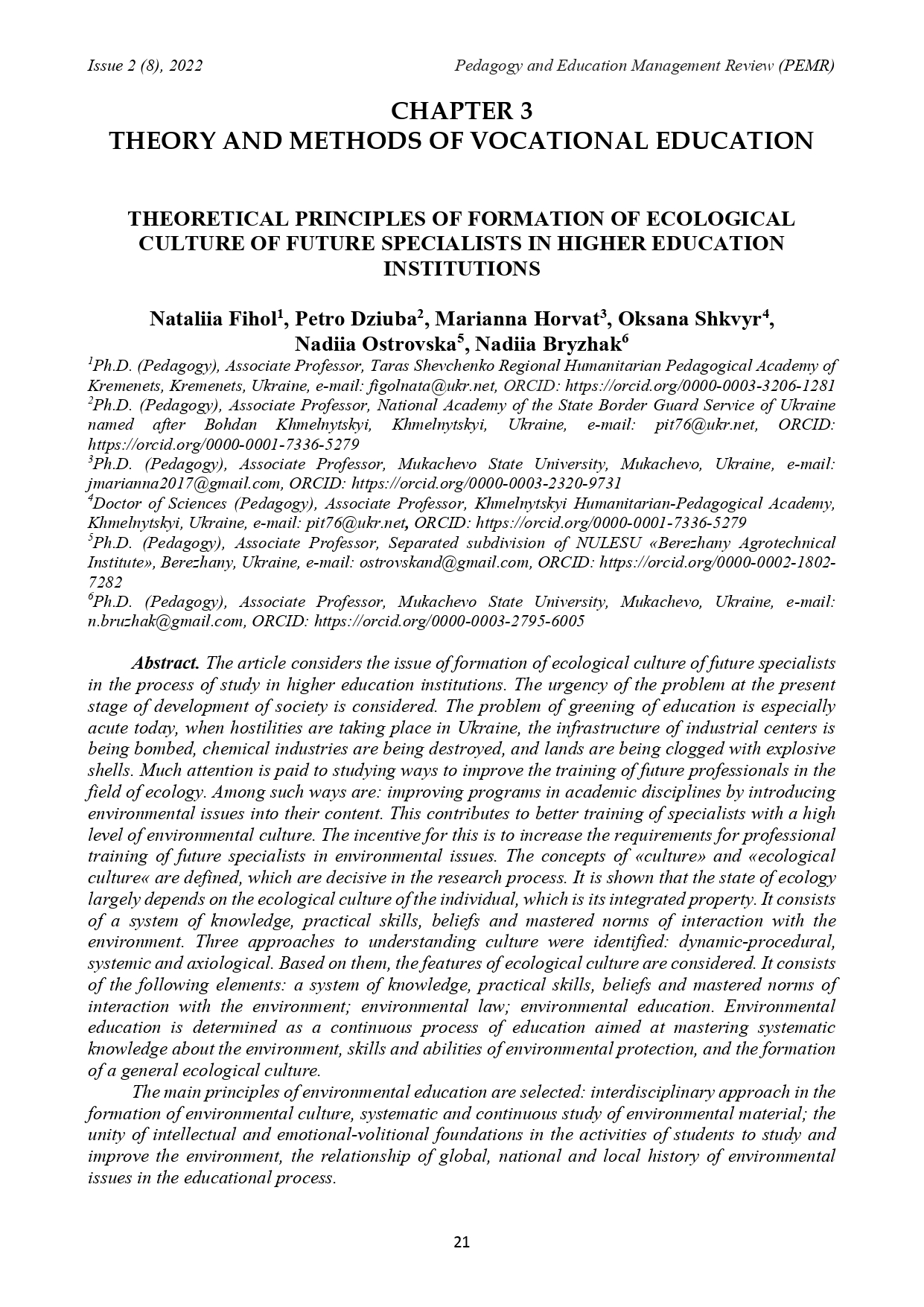THEORETICAL PRINCIPLES OF FORMATION OF ECOLOGICAL CULTURE OF FUTURE SPECIALISTS IN HIGHER EDUCATION INSTITUTIONS
DOI:
https://doi.org/10.36690/2733-2039-2022-2-21Keywords:
future specialists, culture, components of culture, ecological culture, ecological education, functions of ecological education, principles of ecological educationAbstract
The article considers the issue of formation of ecological culture of future specialists in the process of study in higher education institutions. The urgency of the problem at the present stage of development of society is considered. The problem of greening of education is especially acute today, when hostilities are taking place in Ukraine, the infrastructure of industrial centers is being bombed, chemical industries are being destroyed, and lands are being clogged with explosive shells.
Much attention is paid to studying ways to improve the training of future professionals in the field of ecology. Among such ways are: improving programs in academic disciplines by introducing environmental issues into their content. This contributes to better training of specialists with a high level of environmental culture. The incentive for this is to increase the requirements for professional training of future specialists in environmental issues. The concepts of «culture» and «ecological culture« are defined, which are decisive in the research process. It is shown that the state of ecology largely depends on the ecological culture of the individual, which is its integrated property. It consists of a system of knowledge, practical skills, beliefs and mastered norms of interaction with the environment. Three approaches to understanding culture were identified: dynamic-procedural, systemic and axiological. Based on them, the features of ecological culture are considered. It consists of the following elements: a system of knowledge, practical skills, beliefs and mastered norms of interaction with the environment; environmental law; environmental education. Environmental education is determined as a continuous process of education aimed at mastering systematic knowledge about the environment, skills and abilities of environmental protection, and the formation of a general ecological culture.
The main principles of environmental education are selected: interdisciplinary approach in the formation of environmental culture, systematic and continuous study of environmental material; the unity of intellectual and emotional-volitional foundations in the activities of students to study and improve the environment, the relationship of global, national and local history of environmental issues in the educational process.
Downloads
References
Lihachev B.T. (1993) Ekologija lichnosti [Ecology of personality] // Pedagogika.- 1993.- №2.-. P.19-23. [in Russian].
Koncepciya ekolohichnoyi osvity Ukrayiny. [The concept of environmental education in Ukraine] Dyrektor shkoly. 2002. №16 (208). P. 20–29. [in Ukrainian].
Zakon Ukrayiny «Pro osnovni zasady (stratehiyu) derzhavnoyi ekolohichnoyi polityky Ukrayiny na period do 2020 roku» vid 21 hrudnya 2010. [Law of Ukraine "On Basic Principles (Strategy) of the State Environmental Policy of Ukraine until 2020" of December 21, 2010] URL: http://zakon0.rada.gov.ua/laws/show/2818-17. [in Ukrainian].
Mateyuk O. P. Formuvannya ekolohichnoyi kul’tury osobystosti: pedahohichni, psyxolohichni ta filosofs’ki zasady [Formation of ecological culture of personality: pedagogical, psychological and philosophical principles] // Duxovnist’ osobystosti: metodolohiya, teoriya i praktyka. Zbirnyk naukovyx prac’. Vypusk 1(14) / Za red. H.P. Shevchenko. – Luhans’k: Vyd-vo Sxidnoukr. nac. un-tu im. V. Dalya, 2006. – P. 153-161. [in Ukrainian].
Honcharenko S. U. Ukrayins’kyj pedahohichnyj slovnyk [Ukrainian pedagogical dictionary] / Semen Ustynovych Honcharenko. – K.: Lybid’, 1997. – 374 p. [in Ukrainian].
Zavhorodnya V. M. Ekolohichne pravo [Environmental law]: navch.-metod. posib. dlya samostijnoho vyvchennya dyscypliny. Sumy: DVNZ «UABS NBU», 2010. 118 p. [in Ukrainian].
Luk’yanova L. B. Filosofs’kyj pidxid do vyvchennya ekolohiyi [Philosophical approach to the study of ecology]. Pedahohika i psyxolohiya prof. osvity. 2008. № 1. S. 27–37. [in Ukrainian].
Rudyshyn S. D. Filosofs’ki osnovy ekolohichnoyi osvity: henezys, suchasni tendenciyi rozvytku [Philosophical foundations of environmental education: genesis, current trends]. URL: http://www.enpuir.npu.edu.ua/bitstream/ 123456789/12830/1/Rudyshin.pdf. [in Ukrainian].
Stefankiv O. M., Maksymovych O. M. Racionalizaciya pryrodo-korystuvannya v APK ta formuvannya ekolohichnoyi svidomosti naselennya [Rationalization of nature management in the agro-industrial complex and formation of ecological consciousness of the population]: monohrafiya. Ivano-Frankivs’k: Simyk, 2012. 180 p. [in Ukrainian].
Kupchak M. Ya., Xarchuk A. I. Ekoloho-pravovi aspekty formuvannya osobystosti faxivciv systemy MNS Ukrayiny. Humanitarni aspekty formuvannya osobystosti [Ecological and legal aspects of personality formation of specialists of the system of the Ministry for Emergencies of Ukraine. Humanitarian aspects of personality formation]: zb. stat. VI Vseukr. nauk. konf. (L’viv, 27 kvit. 2012 r.). L’viv: L’vivs’kyj derzhavnyj universytet bezpeky zhyttyediyal’nosti. P. 372–378. [in Ukrainian].
Brovdij V.M., Vadzyuk N.V., Honchar A.D. Oxorona pryrody [Nature protection]: Posibnyk dlya uchniv starshyx klasiv zahal’noosvitnix shkil, liceyiv, himnazij, koledzhiv. –K.: Heneza, 1997. – P. 142-152. [in Ukrainian].
Voronina L.M. Ekolohichne vyxovannya: suchasni aspekty [Environmental education: modern aspects] // Shkil’nyj svit. – 2002.– – № 38. - S. 3-4. [in Ukrainian].
Zverev I.D. Metodologicheskie osnovy principov i uslovij realizacii jekologicheskogo obrazovanija [Methodological bases of principles and conditions of realization of ecological education] // Pedagogicheskie principy i uslovija jekologicheskogo obrazovanija: Sb. nauch. tr. – M.: NISIMO, 1983. – 98 p. [in Russian].
Haluzyns’kyj V.M., Yevtux M.B. Osnovy pedahohiky ta psyxolohiyi vyshhoyi shkoly v Ukrayini [Fundamentals of pedagogy and psychology of higher education in Ukraine]. – K.: Intel, 1995. –168 p. [in Ukrainian].

Downloads
Published
How to Cite
Issue
Section
License
Copyright (c) 2022 Nataliia Fihol, Petro Dziuba, Marianna Horvat, Oksana Shkvyr, Nadiia Ostrovska, Nadiia Bryzhak

This work is licensed under a Creative Commons Attribution-NonCommercial-NoDerivatives 4.0 International License.





